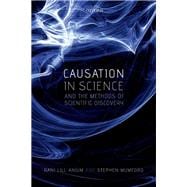
Causation in Science and the Methods of Scientific Discovery
by Anjum, Rani Lill; Mumford, StephenBuy New
Rent Textbook
Rent Digital
Downloadable: 180 Days
Downloadable: 365 Days
Downloadable: Lifetime Access
Used Textbook
We're Sorry
Sold Out
This item is being sold by an Individual Seller and will not ship from the Online Bookstore's warehouse. The Seller must confirm the order within two business days. If the Seller refuses to sell or fails to confirm within this time frame, then the order is cancelled.
Please be sure to read the Description offered by the Seller.
Summary
Author Biography
Rani Lill Anjum is a Researcher of Philosophy at the Norwegian University of Life Sciences (NMBU), working on the relationship between the philosophy of causation and scientific methods. Her PhD is on the logic of conditionals. During her Postdoc at Tromsoe and Nottingham, she wrote the book Getting Causes from Powers (Oxford 2011) with Stephen Mumford, developing a new dispositional theory of causation. As a result of her research project at NMBU, 'Causation in Science', they also co-wrote Causation: A Very Short Introduction (Oxford 2013). Her current research project is 'Causation, Complexity and Evidence in Health Sciences' (CauseHealth).
Stephen Mumford is Professor of Metaphysics in the Department of Philosophy at Durham University as well as Professor II at Norwegian University of Life Sciences (NMBU). He is the author of Dispositions (Oxford 1998), Russell on Metaphysics (Routledge 2003), Laws in Nature (Routledge 2004), David Armstrong (Acumen 2007), Watching Sport: Aesthetics, Ethics and Emotion (Routledge 2011), Getting Causes from Powers (Oxford 2011, with Rani Lill Anjum), Metaphysics: A Very Short Introduction (Oxford 2012) and Causation: a Very Short Introduction (Oxford 2013, with Rani Lill Anjum).
Table of Contents
I. Science and Philosophy
1. Metascience and Better Science
2. Do We Need Causation in Science?
3. Evidence of Causation is Not Causation
II. Perfect Correlation
4. What s in a Correlation?
5. Same Cause, Same Effect
6. Under Ideal Conditions
7. One Effect, One Cause?
III. Interference and Prevention
8. Have Your Cause and Beat It
9. From Regularities to Tendencies
10. The Modality of Causation
IV. Causal Mechanisms
11. Is the Business of Science to Construct Theories?
12. Is More Data Better?
13. The Explanatory Power of Mechanisms
14. Digging Deeper to Find the Real Causes?
V. Linking Causes to Effects
15. Making a Difference
16. Making Nothing Happen
17. It All Started With a Big Bang
18. Does Science Need Laws of Nature?
VI. Probability
19. Uncertainty, Certainty and Beyond
20. What Probabilistic Causation Should Be
21. Calculating Conditional Probability?
VII. External Validity
22. Risky Predictions
23. What RCTs Do Not Show
VIII. Discovering Causes and Understanding Them
24. Getting Involved
25. Uncovering Causal Powers
26. Learning From Causal Failure
27. Plural Methods, One Causation
28. Getting Real About the Ideals of Science
Conclusion: New Norms of Science
An electronic version of this book is available through VitalSource.
This book is viewable on PC, Mac, iPhone, iPad, iPod Touch, and most smartphones.
By purchasing, you will be able to view this book online, as well as download it, for the chosen number of days.
A downloadable version of this book is available through the eCampus Reader or compatible Adobe readers.
Applications are available on iOS, Android, PC, Mac, and Windows Mobile platforms.
Please view the compatibility matrix prior to purchase.
